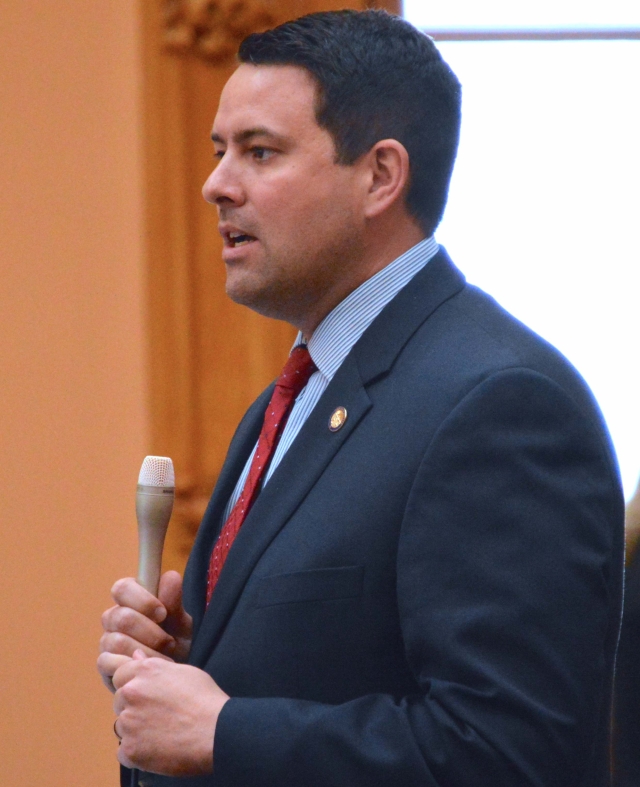McColley Announces Passage of Sweeping Regulation Reform Bills
June 27, 2018
Rob McColley News

COLUMBUS—State Senator Rob McColley (R-Napoleon) today announced the Senate passage of two key pieces of pro-business legislation, Substitute Senate Bills 293 and 255—both of which he was a primary sponsor.
"Today was a huge win for the businesses and workforce in our state," said McColley. "We are sending a strong message that overly burdensome regulations and unnecessary barriers to entry into the workforce will no longer be tolerated.”
Substitute Senate Bill 293, joint sponsored by Senator Bob Peterson (R-Washington Court House), passed the Ohio Senate today with strong support. The bill would require a 30 percent reduction of regulatory restrictions by 2022, with benchmarks of 10 percent reductions each year.
Under the substitute bill, the reduction requirement is narrowed to department level agencies, statewide offices, and specified boards and commissions. If agencies are unable to meet the 30 percent requirement, a "2-for-1" strategy would be implemented where two regulations must be eliminated for each new regulation created.
The two bills aim to address concerns raised at a recent press conference, where the Mercatus Center shared the results of their study of the regulatory environments of 22 states as part of its ongoing “State RegData” project. They concluded that with 246,852 restrictions, Ohio is one of the most heavily regulated states they have analyzed, trailing only New York and Illinois, and far surpassing the neighboring states of Michigan, Pennsylvania, Kentucky and West Virginia.
Substitute Senate Bill 255 would reform Ohio's burdensome occupational licensing process, which has resulted in Ohioans spending hundreds or, in some cases, thousands of dollars to earn a license to begin their career. The bill creates a process for the review of licensing regulations. Under Substitute Senate Bill 255, the Legislative Service Commission must submit a public report on the boards' impacts.
The bill would additionally create an official state policy on the review of occupational licensing boards and regulations, with an emphasis on increasing economic opportunities, promoting healthy competition and encouraging innovation—as well as a process for the sunset of unnecessary occupational licensing boards.
"Today was a huge win for the businesses and workforce in our state," said McColley. "We are sending a strong message that overly burdensome regulations and unnecessary barriers to entry into the workforce will no longer be tolerated.”
Substitute Senate Bill 293, joint sponsored by Senator Bob Peterson (R-Washington Court House), passed the Ohio Senate today with strong support. The bill would require a 30 percent reduction of regulatory restrictions by 2022, with benchmarks of 10 percent reductions each year.
Under the substitute bill, the reduction requirement is narrowed to department level agencies, statewide offices, and specified boards and commissions. If agencies are unable to meet the 30 percent requirement, a "2-for-1" strategy would be implemented where two regulations must be eliminated for each new regulation created.
The two bills aim to address concerns raised at a recent press conference, where the Mercatus Center shared the results of their study of the regulatory environments of 22 states as part of its ongoing “State RegData” project. They concluded that with 246,852 restrictions, Ohio is one of the most heavily regulated states they have analyzed, trailing only New York and Illinois, and far surpassing the neighboring states of Michigan, Pennsylvania, Kentucky and West Virginia.
Substitute Senate Bill 255 would reform Ohio's burdensome occupational licensing process, which has resulted in Ohioans spending hundreds or, in some cases, thousands of dollars to earn a license to begin their career. The bill creates a process for the review of licensing regulations. Under Substitute Senate Bill 255, the Legislative Service Commission must submit a public report on the boards' impacts.
The bill would additionally create an official state policy on the review of occupational licensing boards and regulations, with an emphasis on increasing economic opportunities, promoting healthy competition and encouraging innovation—as well as a process for the sunset of unnecessary occupational licensing boards.



